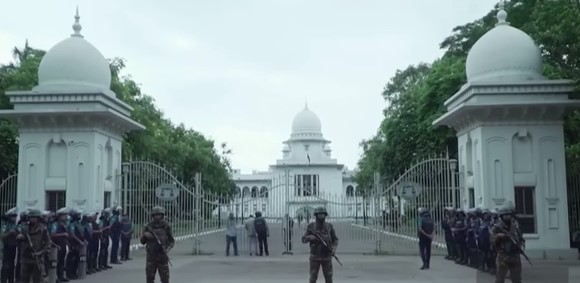Newsman: The Supreme Court’s Appellate Division on Sunday ruled in favor of an appeal from the government, overturned the lower court’s decision and scrapped most of the quotas, directing that 93% of government jobs should be open to candidates on merit.
Hours after that ruling, the Anti-Discrimination Student Movement issued a statement demanding the government reopen campuses and end restrictions imposed as protests raged.
The Bangladeshi student group leading demonstrations suspended protests Monday for 48 hours, with its leader saying they had not wanted reform “at the expense of so much blood”.
Streets appeared calm in Bangladesh’s capital on Monday a day after the Supreme Court agreed to scrap most government job quotas that had angered student-led activists and led todeadly protests. On Monday, there were no reports of violence or protests across the country, officials said.
But late on Sunday, protesters gave Bangladesh’s government 48 hours to meet a string of new demands, including a public apology from Prime Minister Sheikh Hasina for the violence, and the restoration of internet connections disrupted during the unrest.
A public holiday declared over the last two days was extended to Tuesday, according to a government notification.
Normalcy will return within one or two days,” Home Minister Asaduzzaman Khan told reporters.
On Monday most appeared to be obeying a curfew in cities that had seen regular demonstrations after a high court in June reinstated old quotas that reserved many state jobs for descendants of freedom fighters and other groups.
At least 147 people have died in the violence, according to information from hospitals.
Army tanks were seen stationed at several places in the streets of Dhaka, the capital.
He was being treated for his injuries after being beaten by people he accused of being undercover police, he said.
“We demand that during this period the government withdraws the curfew, restores the internet and stops targeting the student protesters.”
“We started this movement for reforming the quota,” Islam said.
At least 163 people have died in clashes, including several police officers, according to an AFP count of victims reported by police and hospitals.
Government officials have repeatedly blamed the protesters and opposition for the unrest.
Dhaka Metropolitan Police spokesman Faruk Hossain told AFP that “at least 532” people had been arrested in the capital since protests began, including some leaders of the opposition Bangladesh National Party.
It also called for the resignation of some ministers and university officials and the dismissal of police officers deployed in the areas where students were killed and demanding the release of jailed protesters and the resignation of officials, including Home Minister Asaduzzaman Khan, who they say are responsible for the violence that left at least 147 people dead.
As violence escalated, the government imposed a curfew from Friday at midnight for an indefinite period, with intermittent gaps of two hours so that people could stock up on essentials.
“The government has decided to impose a curfew and deploy the military in aid of the civilian authorities,” Prime Minister Sheikh Hasina’s press secretary Nayeemul Islam Khan, told the news agency AFP, adding that the curfew would take immediate effect.
Police in the capital, Dhaka, earlier banned all public gatherings for the day – a first since protests began – to forestall more violence.
Internet connection is shutdown.
The government also deployed the army in order to prevent the violence from spreading amid accusations of excessive use of force by the police against protesters. Soldiers were seen patrolling different city points and other districts on Saturday.
Many establishments across the nation including important government buildings, Dhaka’s metro rail, and even a prison in the central district of Narsingdi came under attack from the protesters. Several ruling party offices and houses belonging to some of its leaders were also targeted.
Meanwhile, defying curfew, thousands of protesters, both students and non-students, took to the streets on Saturday with processions, blocked roads and highways and torched tyres and planks of wood across the country and in different parts of the capital.
The government has shut down all public and private universities and sent security forces onto campuses. It said it is willing to meet student leaders.
More than 70 percent of the deaths have been reported from Dhaka, where streets are strewn with the remnants of thousands of rounds of tear-gas shells, sound grenades, shotgun pellets, rubber bullets and brick chunks.
Aside from two policemen and two ruling party supporters, all of the deceased are either students or ordinary people.
State Minister for Information Mohammad A Arafat told Al Jazeera that the protest has been “hijacked” by vested interests. Students, he said, were fighting for “legitimate demands” of quota reform.

